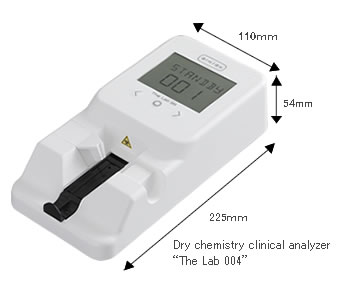Please select your Region.
Please select your Region.
Aug 27, 2019
In recent years, there has been an increasing number of patients in sub-Saharan Africa, not only with the three major infectious diseases (HIV, tuberculosis, and malaria) but also with non-communicable diseases, and especially with an increase of diabetic patients,*1 this has become a serious social issue from the perspective of rising medical costs as well. Behind the increase in patients is rapid urbanization accompanied by diminished exercise and a less balanced diet, low supplies of drugs including insulin, and a lack of knowledge among medical practitioners and patients themselves about diabetes. In addition, rural areas that constitute 60% of sub-Saharan Africa are often unable to access testing due to the lack of testing infrastructure, which leads to delayed discovery of the disease and an increase in severity.
Chronic Kidney Disorder (CKD), one of complications from diabetes, is also on the rise in sub-Saharan Africa*2. In this region where there are also numerous HIV infections, CKD and liver diseases are also known to be caused by long-term administration of anti-HIV drugs. If CKD progresses, dialysis or kidney transplants may be required, but only a handful of regions are equipped with sophisticated medical facilities that support such procedures, causing high medical costs for continued treatment. In light of this situation, we believe that periodic testing of patient wellness and early treatment before the symptoms progress are highly important.
"The Lab 004," developed by ARKRAY, Inc., is a small simplified blood testing device specialized for CKD and liver disease testing that can also be used for liver and kidney function screening to help solve the social issues mentioned above. Its dry biochemistry technology*3 allows its use in environments without sufficient water supply and drainage as well as in areas with an unstable electricity supply by using a mobile battery in addition to the included AC adaptor.
This product will be exhibited at the co-located event of TICAD7, which starts today, and will be launched for sale on a rolling basis in Tanzania, Kenya, Uganda, Mozambique, and other countries from October 2019. By aiding remote and traveling clinics in the sub-Saharan region, we aim to contribute to the early discovery and treatment of CKD and liver diseases in areas that have scant access to medical treatment.
Exhibiting in the Business Expo at TICAD7
Venue: Room A-03, Exhibit Hall D, Pacifico Yokohama
Dates/Times: 11:00 to 18:00, Wednesday, August 28th, 2019
10:00 to 18:00, Thursday, August 29th
10:00 to 18:00, Friday, August 30th

○Kidney and liver function screening
It can monitor kidney function by measuring creatinine, and can monitor kidney and liver damage from side-effects of anti-HIV drugs by measuring AST and ALT.
○Compact, portable and usable in traveling clinics
This compact device can be operated using a mobile battery without the included AC adaptor, so it is usable in areas without a stable supply of electricity. The dry biochemistry technology allows use in environments without access to clean water supply and drainage, enabling it to be used in traveling clinics.
○Easy operation and maintenance-free
After setting the test strip in the device, press the start button and apply the sample. Just insert the tray to start the measurements. The simple device structure does not require periodic maintenance.
*1 The number of diabetes patients in sub-Saharan Africa was estimated to be about 16 million people in 2017 and is projected to rise to 41 million by 2045. This rate of increase is trending higher than any other regions in the world. Another feature of sub-Saharan Africa is that 69% (more than 2 out of 3) of diabetes-afflicted persons are not diagnosed as having diabetes, or do not even realize that they are sick, and this rate is higher than any other regions in the world. (Diabetes Atlas, 8th Edition (2017), International Diabetes Federation)
*2 According to UN population estimates, 1.066 billion people live in sub-Saharan Africa, of which 60% live in rural villages. The CKD disease rate is said to be about 12% with about 76 million patients in rural regions alone.
*3 A method where all reagents needed for reactions at the time of measurement are contained in films and filtration paper, requiring no liquid other than a sample, such as blood, in which the water contained in the sample is sufficient to complete the reaction.
| Name | "The Lab 004" dry biochemistry clinical analyzer | |
|---|---|---|
| Release date | October 2019 | |
| Specifications | ||
| Measurement subject | Blood serum, plasma | |
| Measurement items | Creatinine, uric acid, serum calcium, AST, ALT | |
| Measurement principle | Dual wavelength transmitted light measurement | |
| Measurement time | Approximately 4 to 5 minutes (depending on the item) | |
| Required sample size | 4 μL | |
| External dimensions | W: 110 × D: 225 × H: 54 mm | |
| Weight | 0.6 kg | |
| Sales Area | African nations (sub-Sahara) *There are no plans for sale within Japan | |
![]()
We use (i) Necessary cookies to provide you with services on the website, (ii) Functional cookies to ensure the proper functioning of browsing, (iii) Analytical cookies to collect information to analyze the traffic to the website and (iv) Performance cookies to count visits and traffic sources in order to improve website performance.
You can inhibit Functional cookies and/or both Analytical and Performance cookies by clicking on OPTIONS.
By clicking ACCEPT, it will be deemed that you accept all the mentioned types of cookies.
When you visit our website, we use the following cookies for a variety of purposes and to enhance your online experience on our website. You can change your preferences and accept/decline certain types of cookies that would otherwise be stored on your computer while browsing our website by adding/removing check marks. But keep in mind that deleting cookies may have an impact on your experience with our website.